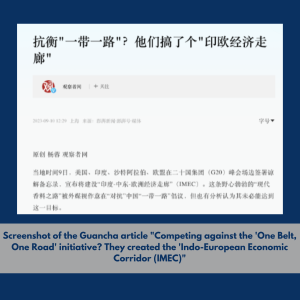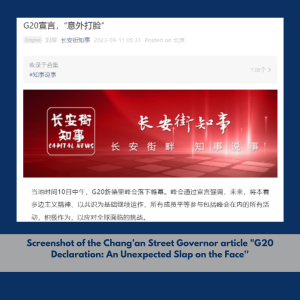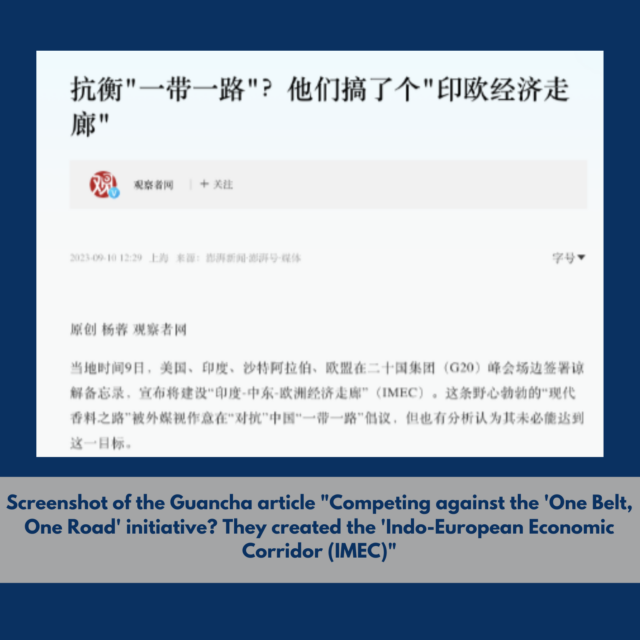NEW DELHI: The announcement of the India-Middle East-Europe Corridor (IMEC) at the G20 summit in Delhi, is drawing considerable interest from Chinese social media. Some of the comments are negative, others say these represent opportunities Beijing would do well to plug in to.
Guancha.cn, a Shanghai-based news site, published an article titled “Competing against the ‘One Belt, One Road’ initiative? Describing the IMEC as an ambitious “modern spice route”, it said the West clearly intended to challenge China’s “Belt and Road” initiative. It also quoted some unnamed analysts as saying that “IMEC may not necessarily achieve this objective.”
It also quoted some experts as saying that IMEC and BRI may not negatively impact each other. The article underscored a comment by China’s Foreign Ministry spokesperson Wang Wenbin, that global infrastructure initiatives should cooperate not compete. The ministry made another point, that it welcomes initiatives that promote global infrastructure development and opposes their use for geopolitical purposes.

Prof. Ding Long of the Middle East Institute of the Shanghai International Studies University wrote a piece that went viral on China’s social media. Titled “The Indo-European Economic Corridor won’t go far if it excludes China,” he accused the US of injecting political and security concerns into infrastructure development. The US, he claimed, was trying to regain influence in the Middle East after its strategic withdrawal and was creating exclusive, smaller multilateral mechanisms like the ‘QUAD’ to concentrate on infrastructure projects all with the aim of containing China, Russia, and Iran.
The US, Ding Long claimed, was trying to side line China at a time when many Middle Eastern countries have responded positively to the BRI, and a series of large-scale projects to address infrastructure deficits in these nations have succeeded with help from China. The positive outcomes resulting from China’s collaboration on the BRI have left the United States feeling frustrated. Consequently, the United States has been actively obstructing and undermining these cooperative projects, seeking to persuade Middle Eastern nations to align with the US version of infrastructure plans.
He warned that such infra projects cost tens of billions of dollars, and hard questions need to be asked about who will pay, how to operate them, and about the profits. In his view, the United States will pay less and get the Arab states to foot the bill.
Another post by Chang’an Street Governor (a popular WeChat handle from Beijing on international and national news) was titled “G20 Declaration: An Unexpected Slap on the Face”. It said the perception at the summit was about the US asserting its dominance over other nations. It said amid all the noise and clamour, the only genuine multilateral moment was the admission of the African Union as the 21st member. It then went on to claim that the African Union’s formal membership in the G20 owes much to the support and endorsement of partners like China.
China was the first country to explicitly support the AU’s admission into the G20 and also called for special arrangements to address African concerns about UN Security Council reform.

Sina Military (which focuses on China’s military related news) shared pictures of US President Biden and South Korea’s Prime Minister Yoon Suk-yeol engaged in deep conversation. “Is this a show-off?, it asked, reflecting growing worries in Beijing over the deepening relationship between Tokyo, Seoul and Washington since the Camp David summit.
On Friday, the widely-read Global Times published an editorial on the G20 summit titled “Who is the ‘Disruptor’ of the New Delhi G20 Summit?” The article claimed the Delhi summit could be the most complex and noisy in history, and hinted at the likelihood of no joint statement. It blamed the US and the West for “tearing the G20 into pieces” since last year’s Bali summit, and said they are actively courting India to counter China. But US actions were only serving to undermine India, it said.
Research Associate at StratNewsGlobal, A keen observer of #China and Foreign Affairs. Writer, Weibo Trends, Analyst.
Twitter: @resham_sng





